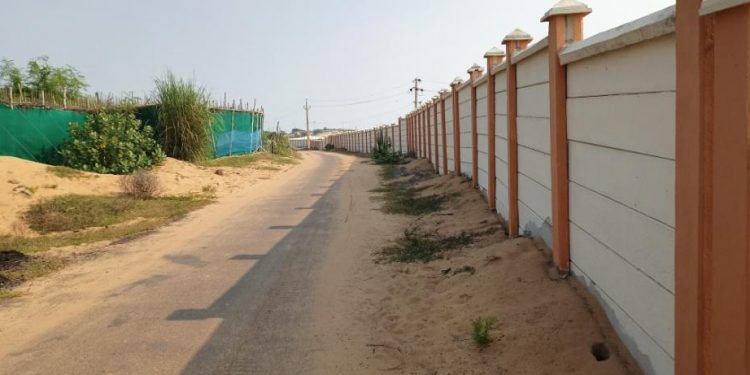Paradip: For the residents of Dhinkia, a sleepy village on the fringes of the port township of Paradip, court seems to be the last resort for any ostensible relief from the endless cycle of violence and tyranny they have been subjected to for long.
First, it was during the forcible eviction from their ancestral land, and subsequent acquisition, by South Korean steel major POSCO, and now the ongoing works for a steel plant and captive port by JSW. The villagers continue to live on the, proverbial, edge.
A visit to ground zero adds credence to what has been widely reported, or talked about, so far about the plight of the hapless masses. Fear is palpable and omnipresent as one walks down the dusty roads of the village. An eerie silence hangs in air, while the doors of the humble dwellings are mostly shut and few peep through partly ajar windows. Needless to say strangers here are viewed with suspicion and taken for plain cloth sleuths looking out for potential troublemakers.
Some who dare speak out squarely put the blame on JSW for the state of affairs. From land acquisition to eviction of betel vines, the villagers are allegedly facing attacks and intimidation every now and then, or being rounded up in bogus cases. “That is why people in the proposed JSW steel plant affected area are unable to protest through democratic means. The court seems to be their last hope for justice,” says a well-known social worker and environmentalist of the locality, Manas Kar. He says the camaraderie once shared between people living across villages like Dhinkia, Gobindpur, Nuagaon, Patana, Mahala, Gadakujanga, Bhuyanpala, Polanga and Nolia Sahi doesn’t exist anymore.
According to Kar, the administration and henchmen of the company have unleashed violence and tyranny to quell protests launched by villagers after the state government announced the POSCO project in 2005. “Police was complicit in that,” he says. While four protestors were, over 350 cases registered against the villagers during the protracted protests between 2005 and 2012, forcing POSCO to finally fold up. “Ironically, instead of handing over the land back to the villagers, it was allotted to JSW after the company signed an MoU with the state government in 2018 for setting up a 13.02 million tonne annual capacity steel plant and a captive port,” Kar adds.
Though protests erupted following the signing of the MoU, the public hearing on the environment for the project was completed December 20, 2019. “So far, more than 100 cases have been filed against the villagers,” he says. Manas Bardhan, a resident of Dhinkia village, says,” JSW is only selling false dreams and never fulfilled its promises. I have been slapped with 22 false cases and thrashed black and blue several times when I raised my voice for the protection of forests, land, and water bodies.” Manas who returned home on bail a month ago, claims he has been constantly under police surveillance. “They (police) are threatening to implicate me in narcotics case if I dare open my mouth again,” he adds. With fear writ large on her face, an elderly woman in the village begged not to click her photograph or mention her name anywhere anticipating retribution from the police.
Another villager, Gagan Mallick, says though over 90 per cent of the villagers are opposed to the project, they are not coming forward fearing frame-up by police. Many allege that the Jagatsinghpur district police are behaving like JSW police as the company has virtually bought them over.
Significantly, over 2,200 betel vines have been evicted so far for the JSW project, forcing the dependents to work as bonded labourers in other states, says Kar. He says the betel farmers of the area were doing business to the tune of Rs 80-90 crore annually with the local UCO bank.” The situation has changed now,” he laments. Meanwhile, JSW officials declined to comment even after they were apprised of the people’s plight.






































